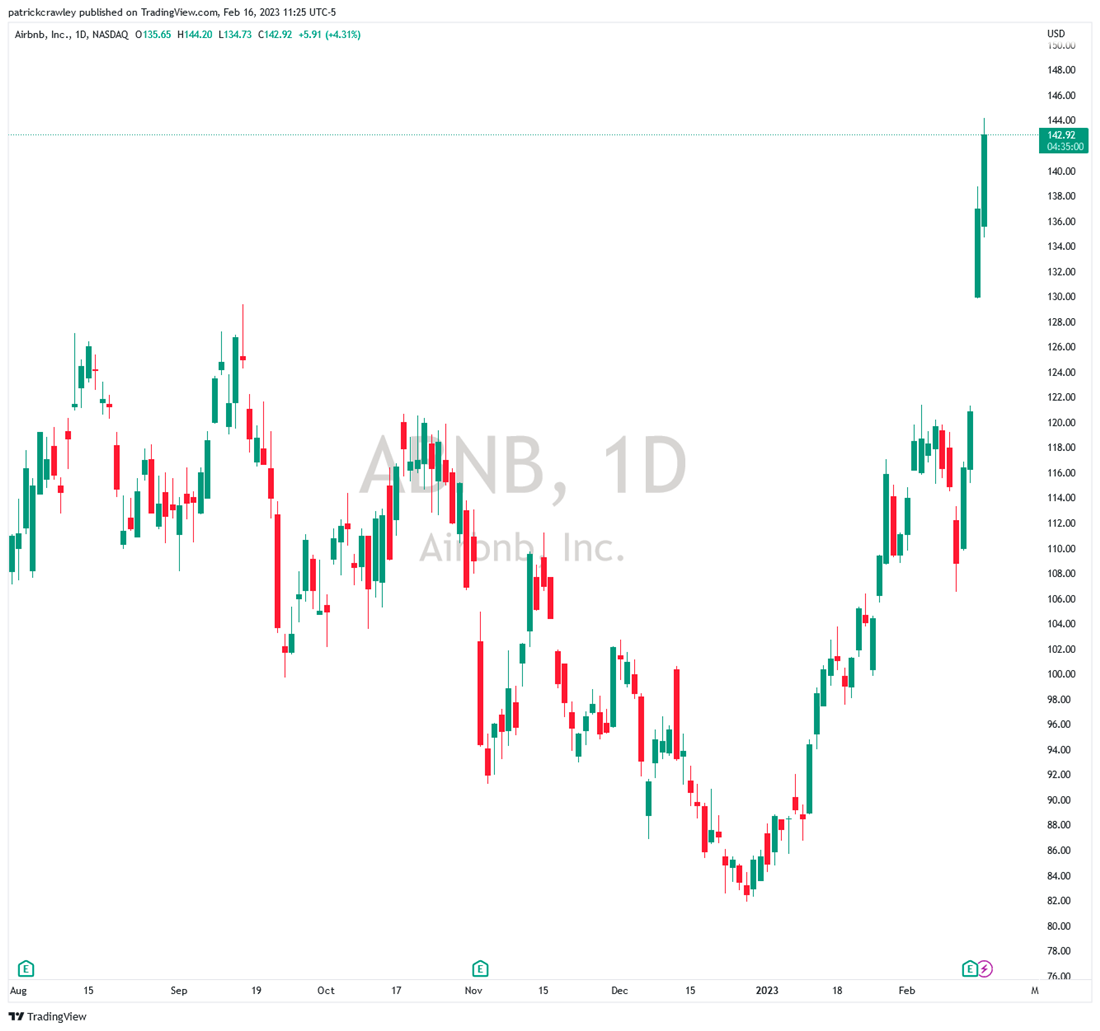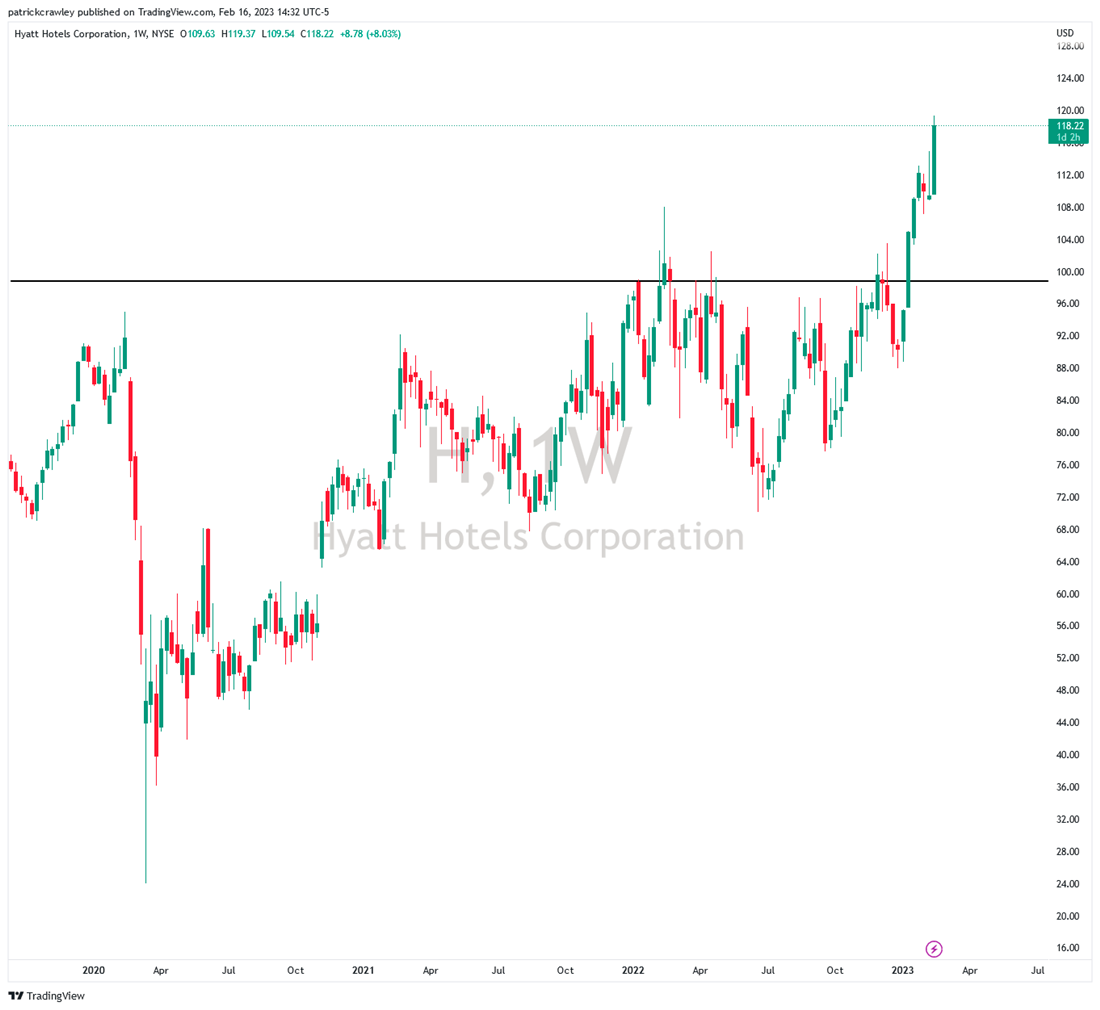
The travel industry has been one of the most challenging sectors to invest in for the past few years, as COVID-19 was such a gut shot to the industry. Travel volume went to near-zero virtually overnight, and it still hasn't fully recovered.
While the US Travel Association doesn’t see a full recovery of pre-pandemic travel volumes until 2024, these three stocks are bucking the trend.
Airbnb Turns the Corner
Airbnb (NASDAQ: ABNB) may have just turned the corner with its blockbuster fourth-quarter earnings report. After three painful years of pandemic challenges, the company posted one of the best quarters in its history.
The biggest name in short-term rentals shattered Wall Street expectations Tuesday when it nearly doubled consensus earnings estimates and reported its first profitable year in its history.
The company reported 48 cents per share in earnings (25 cents expected), showed significant improvements in margins, and grew revenue by 24% year-over-year, which was in line with estimates. The Street loved the report, and many analysts at firms like Citigroup and Wells Fargo hiked their price targets.
More interesting than purely financial metrics, the company has become far more efficient. While its employee headcount sits 5% below pre-pandemic levels, its revenue is 75% higher. And the company is going on offense on the back of all-around improved conditions, having repurchased $1.5 billion of its stock over the past five months.
But lately, the issue of whether Airbnb can sustain demand as assorted cleaning and booking fees become a sticking point on the platform, especially amidst a troubled time for the travel industry.
However, the company's Q4 metrics show strong demand across the board, indicating a high level of consumer confidence. Gross booking value and the number of nights stayed were up 20% year-over-year.
Coming off a rough year that saw the company's stock declined 50%, 2023 is off to a good start. The fourth quarter results catapulted the stock above multiple resistance levels.

MGM Resorts Pushing the Chips in on Macau
MGM Resorts (NYSE: MGM), the casino and resort operator that runs the Bellagio in Las Vegas, is positioned to benefit from China reopening its Macau casino properties massively.
Before the pandemic, Macau was a destination city for gambling and had gambling revenue six times that of Las Vegas. Recent government reports indicate that in January, gaming revenue in Macau surged 82%, compared to the 36% estimate.
And the growth in Macau is just starting, with plenty of upsides left. Official government reports forecast Macau’s 2023 gambling revenue to be less than half of 2019’s pre-COVID levels.
MGM is positioned exceptionally well to take advantage of the opportunity in a reopening Macau, as JP Morgan estimates that MGM has a 16% market share in the Macau casino business. Moreover, the Macau government recently renewed MGM’s casino license for the next ten years.
Macau revenue will flow to the bottom line, as MGM's CEO William Hornbuckle said, "MGM China’s combined properties are the highest earnings businesses within our company” on the company’s most recent earnings call.
Speaking of earnings, MGM also reported improvements in other core businesses in their latest earnings report, giving the stock a 7% boost. The company beat the Street estimates on earnings and revenue, showing impressive growth in its Las Vegas segment and eyeing profitability for its BetMGM sportsbook later in the year.
Look for more Macau gambling revenue data from the local government to gauge how the reopening trend is faring.
Hyatt Sheds the Fat
Hyatt Hotels (NYSE: H) is an operator of luxury hotels and resorts, offering its customers a higher level of personalized service. Traditionally, the company has operated an asset-heavy business compared to its peers by owning or leasing a more significant portion of its properties.
However, in recent years, the company has shifted to an asset-light approach, emphasizing management and franchise fees more heavily than profits from their owned/leased hotels.
This shift towards a fee-based model makes the company more scalable, as there's a natural limit to how many hotels you can buy or lease. At the same time, growing a fee-based business doesn't have such limitations, as you don't have to purchase the hotel.
This plan involved divesting from capital-intensive owned properties like the Hyatt Regency in Greenwich, CT, and instead making strategic acquisitions like Two Roads Hospitality and Apple Leisure Group to their fee-based business.
And the plan seems to be working, as their North American fee-based business far surpassed 2019 pre-COVID levels, earning $422 million in adjusted EBITDA in 2022, compared to $380 million in 2019.
Given Hyatt's heavy emphasis on luxury properties, some investors ask, "what recession?" as their customers are unperturbed by inflation and paying ever-higher room rates.
Wall Street is also picking up on the story, as their stock has risen 33% year-to-date and sits at all-time highs following Thursday's fourth-quarter earnings report.
Critically, the stock finally managed to convincingly breach its pre-COVID resistance level of $100 after several failed attempts. At all-time highs and multi-year resistance in the rear-view mirror, there's strong potential for the upside momentum to continue.

Looking forward, the stock is firmly holding above its recent higher low, in the $108 to $110 area is critical to the success of the trend. A convincing close below the level will likely scare off the momentum traders.
Bottom Line
Conventional wisdom says travel stocks underperform when recession fears are high. But these three travel stocks: Airbnb (NASDAQ: ABNB), MGM Resorts (NYSE: MGM), and Hyatt Hotels (NYSE: H), weathered the storm despite perceived challenges for the travel industry.




